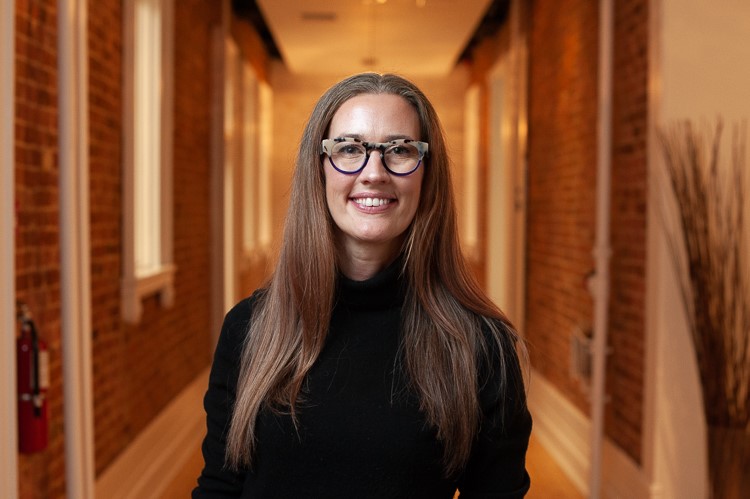In March of 2021, the Trottier Family Foundation began its Staff DAF program, in which a DAF is set up for each individual employee with a sum of $5000 per year that they can grant to charities of their choice. Operated via a Donor Advised Fund (DAF) managed by MakeWay, there’s no matching of funds required or strings attached. Each of the five staff members gets to decide where to grant the money, and this does not have to be aligned with the types of organizations that the Trottier board typically gives to.
“In essence, each staff member has a mini-foundation set up in their name and this is done in a manner that requires no board approval,” explains the foundation’s executive director Éric St-Pierre. This has been named the Staff DAF program, and not surprisingly it has been received with great enthusiasm by the foundation’s team.

As far as St-Pierre is aware, the Trottier Family Foundation is the only organization in Canada that includes a $5000 grant to a charity of your choice as an employee perk without the need for an employee to contribute any of their own funds. When St-Pierre first brought the Staff DAF idea to the foundation’s board, he says that they embraced it whole-heartedly, and when he relayed it to managing director Laura Butler there were a lot of high-fives.
For her first year, Butler chose to support an organization that is working on advancing effective and just humane responses to crime and its causes in Canada. This aligned with work that her late father did after retirement and touched upon several issues that she cared deeply about including the massive overrepresentation of Indigenous populations within the prison and justice system. “I looked at what things are not particularly well-funded where $5000 a year could make a difference, and working with prisoners is what I doubled down on,” Butler says.

Although the Trottier Family Foundation is a grant-giving organization, it was decided that the best way of divvying out funds was through a MakeWay DAF. “A lot of different factors came into that decision but administratively, setting up the Staff DAF program through MakeWay made sense. If a staff member wanted to give out five different grants, that is five different grants we have to administer, and because our [Staff DAF] grants don’t have to align with the Trottier Family Foundation mandate we wanted that separation,” says St-Pierre, “Plus, our values are very aligned with MakeWay in terms of impact investing.”
As an alternative to setting up your own foundation, a DAF offers philanthropists a number of benefits that enable them to support the charities that they care about. While alleviating the administrative burden is one clear advantage to using a MakeWay DAF, it also helps speed up the process of allocating funds, and offers ease of use through an online portal where donors can view or add the funds, and advise grants to charities, with minimal hassle.
In recent years there has been growing criticism of DAFs in Canada, but MakeWay wants to change this. For us the goal is not to use DAFs as an accumulation and preservation of capital but rather to get more funding flowing into community.
Leanne Burton, MakeWay’s Director of Partnership Development helps oversee roughly 140 MakeWay DAFs, “It’s a brilliant employee benefit to be able to contribute in the name of an employee where they can allocate those funds wherever their values lie and support the change that they want to see in the world,” says Burton. By choosing to partner with MakeWay on the Staff DAFs, the Trottier Family Foundation team can tap into advice that they know comes from a place of collaboration and community partnership to make a difference in communities across Canada.
Transparency
Being transparent about how Staff DAF funds are distributed is important to the Trottier Family Foundation. DAFs are often cast in a negative light, and historically there has been good reason for that — the use of DAFs has exploded in Canada over the past decade as they have been promoted by financial advisors as a way for the wealthy to reduce taxes and preserve assets, with — in some cases — only dribbles of money granted to charitable organizations each year. Somewhat shockingly, as little as 3.5 percent of the value of the fund has to be granted out and often sits there as an untouchable asset.
MakeWay’s approach is different. By partnering with philanthropists and foundations that are purpose-driven and intentional in how they want to give, MakeWay DAFs distribute well over the regulated minimum requirement of 3.5 percent. In fiscal year 2020, 27.7 percent of the value of DAFs at MakeWay was distributed across the country. When operated with an active giving approach, DAFs are an effective way to direct funds to create real change.
“For us, most of the donor advised funds are focused on issues that are aligned with MakeWay’s mission. DAFs are not simply just a product offering, they are an agile tool for supporting nature and communities to thrive together,” says Burton.
Multiple benefits
While the immediate benefit of the Staff DAF is that employees get to do good and feel good about that, a number of other benefits have become apparent since the program was introduced. St-Pierre says that the process has helped equip the team with stronger skills, and give them a better understanding of philanthropy from a personal point of view.
Butler says that the program has given the team a different perspective on what the foundation’s board goes through and the difficult choices that they have to make — albeit on a smaller scale. “I find it very empowering, and it speaks to the reality of working for a foundation,” Butler says, “I had to think strategically about whether I could have more of an impact if I did that completely unrestricted operationally as opposed to dedicating it to a certain project.”
St-Pierre has directed his first grants to community programs in Northern Ontario — where he grew up — that face many social challenges but are offered little philanthropic support. “I realized that If I’m giving to programs in my hometown because of my personal bias, then I know if I’m biased, then my board is biased and I’m aware of how that is an issue. It’s a good learning tool for us,” he says.
As the foundation grows their team, they are finding that the Staff DAF is seen as an attractive incentive when interviewing for new positions. Butler explains, “While many organizations offer health benefits, dental, and cool team building incentives, this is a staff benefit that really speaks to the values of the staff that work with us and it says a lot about us as a foundation and our culture.”
Editor’s Note: an earlier version of this story indicated the DAF disbursement rate was 17% in FY2020. That number was corrected to 27.7%. In FY2021, the DAF disbursement rate was 13.3%, a decrease as a result of the Covid-19 pandemic.
